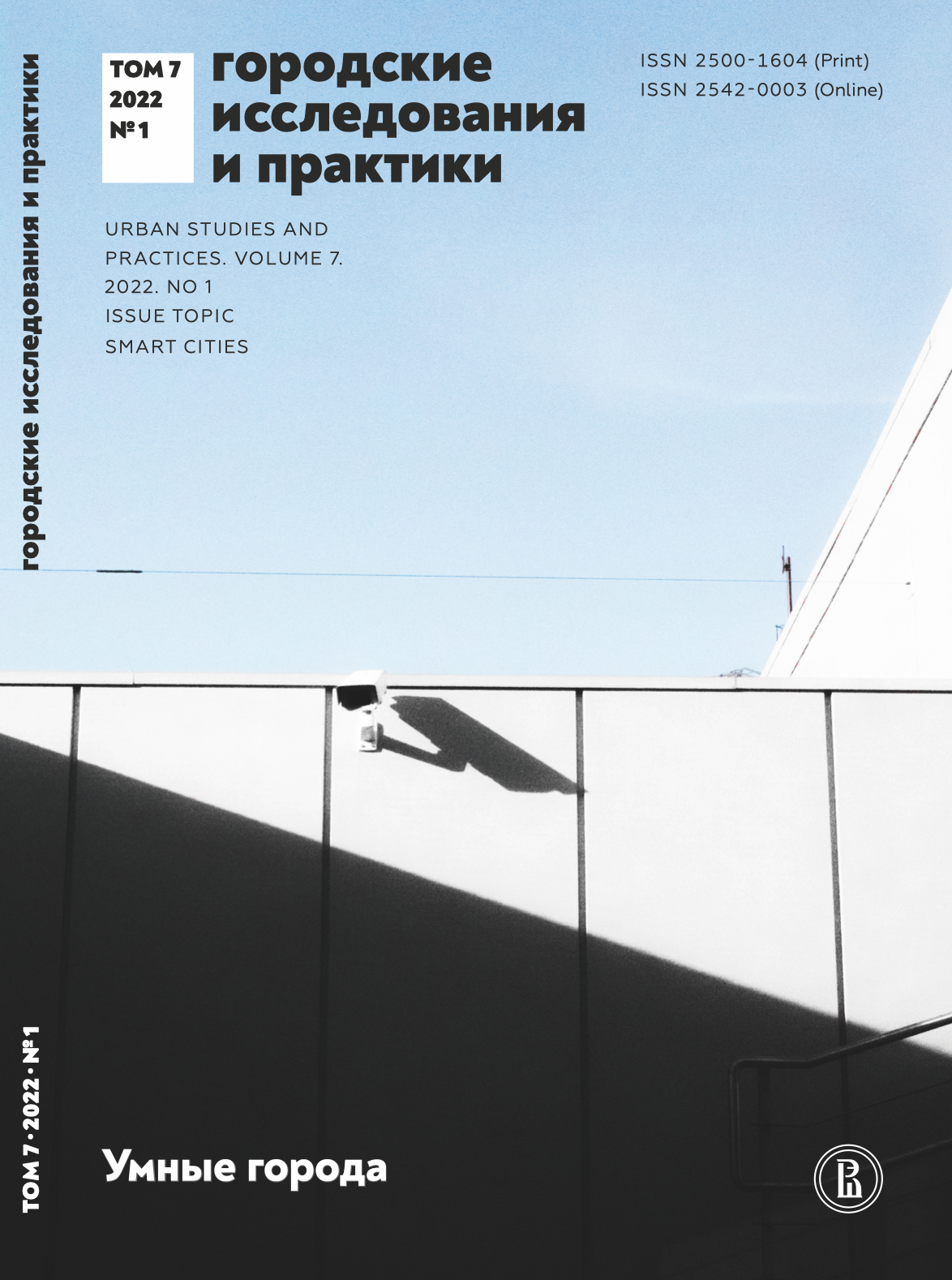Who Makes Decisions in the Smart City
Abstract
This article focuses on the widespread but vague concept of the smart city. The smart city is a visionary projection, around which are an eclectic ensemble of often contradictory theoretical attitudes and doctrines that link urban development with the development of technology, especially digital technology. We argue that the work of the British cyberneticist Gordon Pask on the theory of “aesthetically charged environments” sheds light on a key aspect of the problem of the smart city. Pask emphasizes the fundamental dependence of the problem of human control and emotional interaction with the urban, technology-saturated environment, which still remains a blind spot for most researchers of the smart city. A critical analysis of modern approaches to the smart city has shown that there are two crucial conditions for the success the smart city policy: 1) the increasing variety of algorithms and competition between technical devices; 2) not just total digitalization or the creation of a technological “framework”, but designing the city as a technological environment with a powerful emotional potential. The authors believe that the emotional and cultural-aesthetic dimension is only a barely outlined direction of future research on the smart city, digital technology, and engineering.
Downloads
References
Александер К. (2014) Язык шаблонов: города, здания, строительство. М.: Изд-во Студии Артемия Лебедева.
Арнштейн Ш. (1969) Лестница гражданского участия // Электронная библиотека RoyalLib.com. URL: [http://royallib.com/book/arnshteyn_sherri/lestnitsa_gragdanskogo_uchastiya.html](http://royallib.com/book/arnshteyn_sherri/lestnitsa_gragdanskogo_uchastiya.html) (дата обращения: 23.09.2021).
Гидденс Э. (1994) Судьба, риск и безопасность // Thesis. No 5. С. 107–134.
Бейтсон Г. (2000) Сознательная цель против природы // Экология разума. Избранные статьи по антропологии, психиатрии и эпистемологии. М.: Смысл.
Вахштайн В. C. (2005) Возвращение материального. «Пространства», «сети», «потоки» в акторно-сетевой теории // Социологическое обозрение. Т. 4. No 1. С. 94–115.
Лиотар Ж.-Ф. (1998) Состояние постмодерна. Спб.: Алетейя.
Маклюэн М. (2003) Понимание медиа: внешние расширения человека. М.: Канон-Пресс-Ц, Кучково поле.
Фуко М. (1996) Воля к истине: по ту сторону знания, власти и сексуальности. Работы разных лет. М.: Касталь, 1996.
Хуэй Ю. (2020) Рекурсивность и контингентность. М: V-A-CPress.
Шиллер Ф. (1957) Письма об эстетическом воспитании человека / Ф. Шиллер. Собр. соч. в 7 т. Т. 6. М.: Гос. изд-во художественной литературы.
Beniger J. R. (2005) The Control Revolution: Technological and Economic Origins of the Information Society. Cambridge, Mass: Harvard University Press.
Drinhausen K., Brusse V. (2021) China’s Social Credit System in 2021. From Fragmentation towards Integration // China Monitor. March 3. Режим доступа: [https://merics.org/sites/default/files/2021-06/MERICS%20China-Monitor%2067%20Social%20Credit%20System%20final3.pdf](https://merics.org/sites/default/files/2021-06/MERICS%20China-Monitor%2067%20Social%20Credit%20System%20final3.pdf) (дата обращения: 23.09.2021).
Ellule J. (1990) The Present and the Future // Technology as a Human Affair / L. A. Hickman (Ed.). New York: McGraw-Hill.
Fischer C. S. (1995) The Subcultural Theory of Urbanism: A Twentieth-Year Assessment // American Journal of Sociology. Vol. 101. No. 3. P. 543–577.
Forrester J. W. (1969) Urban Dynamics. Waltham, MA: Pegasus Communication.
Giffinger R., Fertner C., Kramar H., Kalasek R. et al. (2007) Smart Cities: Ranking of European Medium-Sized Cities. Режим доступа: [www.smart-cities.eu/download/smart_cities_final_report.pdf](http://www.smart-cities.eu/download/smart_cities_final_report.pdf) (дата обращения: 23.09.2021).
Kitchin R. (2014) The Real-Time City? Big Data and Smart Urbanism // GeoJournal. Vol. 79. P. 1–14.
Kittler F. A., Griffin M. (1996) The City is a Medium // New Literary History. Vol. 27. No. 4. P. 717–729.
Krivý M. (2016) Towards a Critique of Cybernetic Urbanism: The Smart City and the Society Of Control // Planning Theory. Vol. 17. No. 1. P. 8–30.
Latour B. (2011) Network, Societies, Spheres: Reflections of an Actor-Network Theorist // International Journal of Communication. Vol. 5. P. 796–810.
[1960] Metabolism 1960: the Proposals for a New Urbanism. Tokyo, Bijutu Syuppan Sha.
Pask G. (1969) The Architectural Relevance of Cybernetics // Computational Design Thinking. Vol. 39. No. 9. P. 70–72.
Pask G. (1971) A Comment, a Case History and a Plan // Cybernetics, Art, and Ideas / J. Reichardt (ed.). Greenwich, CT: New York Graphics Society.
Sassen S. (2012) Urbanizing technology // Electric City. Режим доступа: [https://lsecities.net/wp-content/uploads/2012/12/the-electric-city-newspaper.pdf](https://lsecities.net/wp-content/uploads/2012/12/the-electric-city-newspaper.pdf) (дата обращения: 23.09.2021).
Sassen S. (2013) Open Sourcing the Neighborhood // Forbes. Режим доступа: [https://www.forbes.com/sites/techonomy/2013/11/10/open-sourcing-the-neighborhood/?sh=614bf8964df0](https://www.forbes.com/sites/techonomy/2013/11/10/open-sourcing-the-neighborhood/?sh=614bf8964df0) (дата обращения: 23.09.2021).
Sennett R. (2012) The Stupefying Smart City // Urban Age. Режим доступа: [https://urbanage.lsecities.net/essays/the-stupefying-smart-city](https://urbanage.lsecities.net/essays/the-stupefying-smart-city) (дата обращения: 23.09.2021).
Vanolo A. (2014) Smartmentality: The Smart City as Disciplinary Strategy // Urban Studies. Vol. 51. No. 5. P. 883–898.
Verebes T. (2014) Masterplanning the Adaptive City. Computational Urbanism in the Twenty-First Century. New York: Routledge.
Xin Dai (2018) Toward a Reputation State: The Social Credit System Project of China. Peking University — Peking University Law School.

